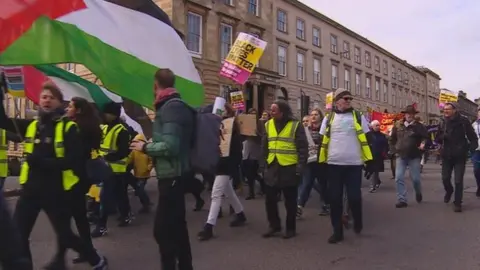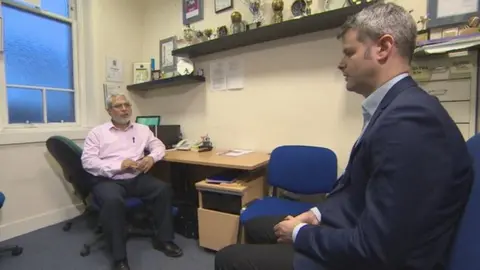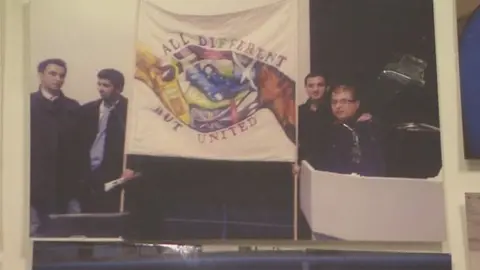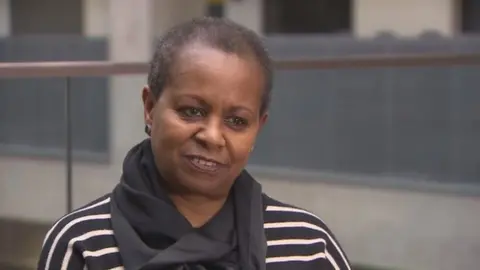The fight against racism in Scotland
 BBC
BBCIt's been another week in which racism in Scotland has returned to the headlines.
This time, a Labour councillor, Jim Dempster, has been suspended by his party after he admitted making an Islamophobic comment about Transport Minister Humza Yousaf.
On Saturday, hundreds of people from all backgrounds marched through the middle of Glasgow, to highlight racism.
Many of those who took part had their own stories to tell.
One young Syrian refugee told us: "When I came here I could not speak English at all.
"Someone told me, 'just go back to your country if you are not able to speak English'. That really affected me."
Another man who was targeted because of his race, added: "I've been threatened that my house was going to be bombed, I was gong to be killed, my child was going to be killed."
Racism 'rife'
In a small office in Glasgow's Govanhill area, Raza Sadiq is trying to bring about big change.
This is a part of the city with a diverse mix of ethnic minority groups. It also has high levels of social deprivation.
For 20 years, Mr Sadiq has been trying to empower young people through Active Life Club, a voluntary organisation he helped set up.


Among the many trophies, plaques and awards in his room is an old photo featuring three youthful men - Humza Yousaf, Anas Sarwar and Aamer Anwar.
All three would go on to high-profile careers in politics and the law - and use their status to call out racism.
Despite all this work, Mr Sadiq says the problem is getting worse.
"In the past, some people were blunt in your face, but now overt racism is daily and rife", he said.
"I can't name any single mainstream organisation who can put their hand up and say they are fairly representative of communities they serve.
"Islamophobia is on the rise. Hate crime is on the rise. Brexit has affected so many ethnic minorities."
Optimistic feeling
Today, we often hear of public figures who behave offensively undertaking training to address their behaviour.
In February, Labour MP Hugh Gaffney apologised for making offensive remarks about the LGBT community and Chinese people at a Burns Supper in Edinburgh.
He said he would go on an equality and diversity course - but is that a solution?
For many years, Gillian Neish has been proactively training organisations to make sure all their workers are respected and treated equally.
But can you fix things by sending someone on a course after they've made offensive comments?

"I don't think training is necessarily the response that's needed," she said.
"When they make those kinds of remarks - even if the second they make it they don't realise how badly it's going to be received - they must know that kind of language is just not acceptable.
"There have been too many incidents of that kind of language being used and that being reported as being unacceptable."
Ms Neish added: "Training is a space to explore things in new ways and look at new ways of doing things.
"So I think it's more an issue of, 'take responsibility for making an unacceptable remark, and there are consequences for that'."
The feeling from events like the anti-racism march is optimism - but at the same time, a belief that there's much more to do.
See more on Sunday Politics Scotland, on the BBC iplayer
